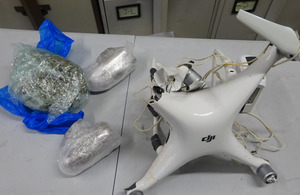New prison ‘no-fly zones’ for drug-delivering drones
Vast new ’no-fly zones’ will be enforced over all prisons in England and Wales to crack down on gangs using drones to smuggle drugs, phones and weapons that drive criminality behind bars.

- new airspace restrictions to create 400 metre ‘no-fly zones’ around prisons
- offenders who break the rules face up to ten years behind bars
- tough new security measures to cut key supply route of illegal drugs and phones
New legislation made this week will make it an automatic offence to fly drones within 400 metres of any closed prison or young offender institution in England and Wales. Drone operators that break the rules could face fines of up to £2,500 while those found smuggling illicit items will face up to 10 years in prison.
Drone sightings at prisons have increased sharply in recent years and current air space restrictions mean police can only act on drone sightings where there is evidence of contraband being illegally smuggled.
By creating a virtual ‘no-fly zone’ around prison airspace, the new restrictions mean police and prison staff will be able to act quickly to identify suspicious drones and take swift action against suspected criminal activity, as well as enhancing security by preventing illegal filming.
Prisons Minister Damian Hinds said:
This is the latest step in the war we are winning to stop drugs, weapons and phones getting into our prisons.
These virtual ‘no-fly’ zones - along with our new airport-style X-ray scanners - mean we can clamp down better than ever on violence behind bars to keep both prisoners and staff safe from harm.
Between 2019 and 2021, 504 drones were either sighted, intercepted or seized around prisons in England and Wales, and police and prison staff have worked together to help secure more than 70 convictions since June 2016. Those sentenced are serving more than 240 years in prison.
A single attempted drone delivery in May 2022 contained a payload of over £35,000 worth of illicit substances and contraband. This included 399 buprenorphine tablets, around 30 grammes of cannabis and 11 mobile phones.
Today’s announcement (23 October 2023) follows a £100 million investment to bolster prison security across the estate – including 75 additional x-ray body scanners and airport-style Enhanced Gate Security at 42 high-risk prison sites, implementing routine searching of staff and visitors.
The new restrictions were made into law on Monday 16 October 2023, with the support of Department of Transport and Civil Aviation Authority. It will take effect from 25 January 2024.
The new measures will build on current legislation including the Air Traffic and Unmanned Aircraft Act 2021 (ATUMA), which gives police the power to intercept or seize drones suspected of being used to break the law, as well as any use of drones which break the Prison Act 1952 – such as through smuggling drugs and weapons.